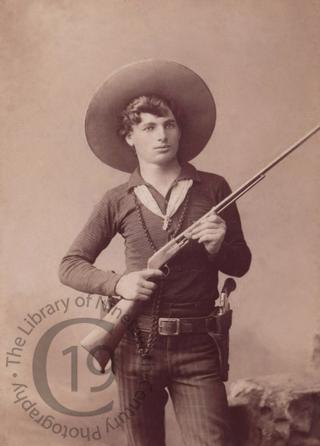
'Texas Jack Junior'
A cabinet card portrait of the entertainer known as 'Texas Jack Junior,' who appeared with Mexican Joe's Wild West Show.
Texas Jack, Jun. took his name because as a five-year-old child he had been rescued by the frontier scout and Old West gunfighter Texas Jack Omohundro, whose real name was John Baker Omohundro (1846-1880). His parents had apparently been attacked and killed by Native Americans and the child – along with two small girls – had been left to die.
According to Wikipedia, he was ‘a sharpshooter and trick rider in shows around the world, especially South Africa.’ By 1887 he was appearing in Liverpool with Mexican Joe’s troupe of Wild West entertainers. An article in the Liverpool Mercury (12 August 1887) reported that the act numbered ‘about 30 persons, and includes cowboys – some of whom are called by the delightfully suggestive names of Texas Jack, Lasso Mack, California Frank, Suspender Jack, Buckskin, Nevada Fred, Colorado Charlie, and Arizona Pete – and a party of Indian warriors and squaws under Black Hawk, a Sioux chief famous for his scalping achievements. […] The programme seems to include everything that will illustrate life on the prairies and in the Far West generally.’
A week later it was widely reported that ‘Texas Jack, one of Mexican Joe’s Wild West Show, located at the Liverpool Exhibition, had an unpleasant experience yesterday. He was riding one of the troop’s mustangs through the city, in all the glory of war paint, when he was arrested by a policeman, who alleged that the animal was debilitated and unfit to be ridden. Texas Jack was marched off to Bridewell, followed by a large and admiring crowd, creating a great sensation. He was released on giving his name’ (Aberdeen Express, 17 August 1887).
While appearing with the show in England, numerous newspapers reported that Texas Jack had married another member of the cast. ‘Great excitement prevailed in West Derby Road, Liverpool, to-day, when the tombstone coach used in Mexican Joe’s Wild West Show drove up to the Registrar’s Office. The coach was decorated with the American flag, and contained Texas Jack and one of the female members of the troupe named Carrie, a crack shot. The two were made one by the Registrar, and when they re-entered the coach were treated to quite an ovation by the assembled crowd’ (Manchester Evening News, 4 August 1887). However, according to many other newspapers the marriage was between by Oliver Frank Baxter, known professionally as ‘Montana Bill,’ and a Miss Mary Currie, who ‘had charge of the confectionary stall at the exhibition’ (Gloucester Citizen, 25 August 1887), The Civil Registration Marriage Index confirms that such a marriage did indeed take place.
For a while he ran his own Wild West show, which operated under the name ‘Texas Jack’s Wild West.’ The troupe was in Germany in 1894, in Italy and France in 1895 and back in Germany in 1896. In 1897 and 1898 they appeared in Norway, Sweden and Russia (London Evening Standard, 28 February 1900).
By 1898 he was apparently living in South Africa. That year a newspaper mentioned under the crosshead ‘Sport in South Africa’ that ‘Texas Jack, the American prairie rider’ had been giving exhibition rides’ (Cycling, 24 September 1898). In 1901 he was back in England appearing in a show called ‘Savage South Africa.’
In July 1904 in Bristol his wife Lyle Jack was fined 40 shillings, with £3 costs, for assaulting her little sister. ‘At eleven o’clock at night the defendant took the child to a brook at Eastville, and standing her in the water stripped and beat her with a riding whip for pilfering’ (‘Lenient Punishment for an Unnatural Sister,’ Manchester Evening News, 4 July 1901).
Later that year Jack appeared in Warrington for a short season with a show entitled ‘Texas Jack’s Prairie Life.’ A local newspaper described him as ‘a well known American war scout.’ According to the same source, ‘Texas Jack in his representations of Prairie Life will introduce his marvellous feats of horsemanship, rifle and pistol shooting and lasso throwing, smashing objects while at full gallop, & c. Texas Jack has performed in every part of the world including London, New York, Paris, Vienna, St Petersburg, India, Java, New Zealand, Sydney, Melbourne, and has appeared by Royal command before his Majesty King Edward VII’ (Warrington Examiner, 28 September 1901).
In 1904 it was reported that ‘Texas Jack’s Wild West Show and American Circus are playing to good business in East London. […] Texas Jack has just arrived from America with seven real Red Indians who give a remarkable performance of prairie life’ (The Era, 23 January 1904).
Texas Jack died at Kroonstad in South Africa at the end of 1905. ‘Texas Jack, well known to the circus profession in England and on the Continent as an expert rifle shot and rough-rider, died at Kroonstad a few days ago from an attack of double pneumonia. Texas Jack was first brought to this country [South Africa] by Frank E. Fillis in 1898, and appeared as one of the features of the show. During the Boer War he served with the British forces, and shortly after peace was proclaimed he organised a small show with which he toured South Africa and made a small fortune in a few months. At the end of his first tour he paid a flying visit to America in search of attractions, and returned with a band of Indian Braves and several clever performers and again toured the country with remarkable success. The show was disbanded about twelve months ago and Texas Jack retired from the show business. He purchased a farm near Kroonstad, where he intended breeding horses on a large scale. His wife survives him’ (‘Notes from South Africa,’ Music Hall and Theatre Review, 29 December 1905).
Photographer and location unidentified.
Code: 122100




